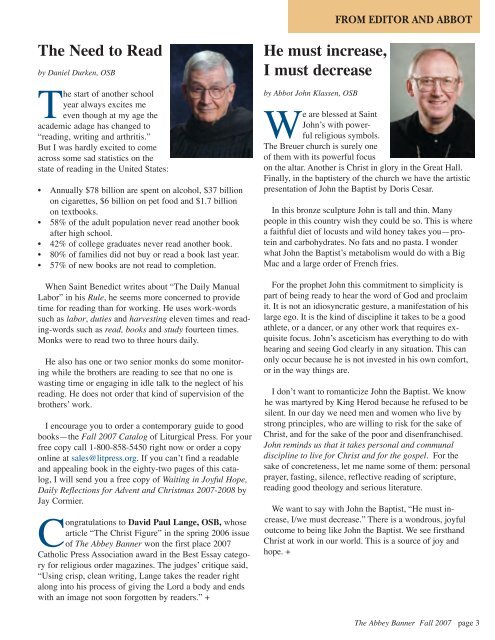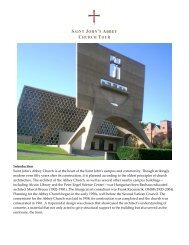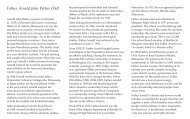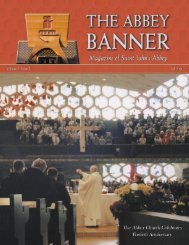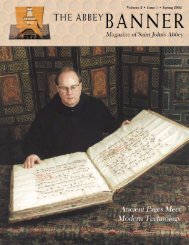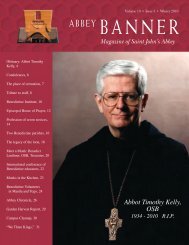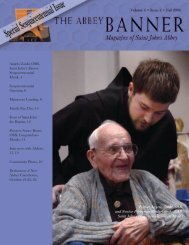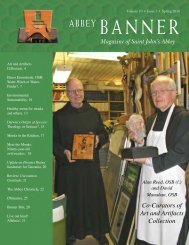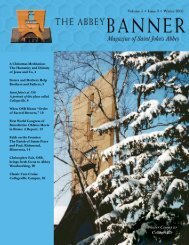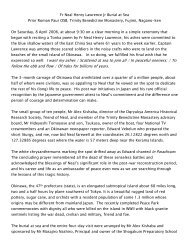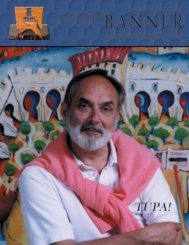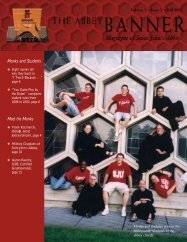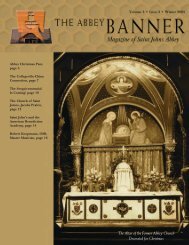THE ABBEY BANNER - St. John's Abbey
THE ABBEY BANNER - St. John's Abbey
THE ABBEY BANNER - St. John's Abbey
You also want an ePaper? Increase the reach of your titles
YUMPU automatically turns print PDFs into web optimized ePapers that Google loves.
The Need to Read<br />
by Daniel Durken, OSB<br />
The start of another school<br />
year always excites me<br />
even though at my age the<br />
academic adage has changed to<br />
“reading, writing and arthritis.”<br />
But I was hardly excited to come<br />
across some sad statistics on the<br />
state of reading in the United <strong>St</strong>ates:<br />
• Annually $78 billion are spent on alcohol, $37 billion<br />
on cigarettes, $6 billion on pet food and $1.7 billion<br />
on textbooks.<br />
• 58% of the adult population never read another book<br />
after high school.<br />
• 42% of college graduates never read another book.<br />
• 80% of families did not buy or read a book last year.<br />
• 57% of new books are not read to completion.<br />
When Saint Benedict writes about “The Daily Manual<br />
Labor” in his Rule, he seems more concerned to provide<br />
time for reading than for working. He uses work-words<br />
such as labor, duties and harvesting eleven times and reading-words<br />
such as read, books and study fourteen times.<br />
Monks were to read two to three hours daily.<br />
He also has one or two senior monks do some monitoring<br />
while the brothers are reading to see that no one is<br />
wasting time or engaging in idle talk to the neglect of his<br />
reading. He does not order that kind of supervision of the<br />
brothers’ work.<br />
I encourage you to order a contemporary guide to good<br />
books—the Fall 2007 Catalog of Liturgical Press. For your<br />
free copy call 1-800-858-5450 right now or order a copy<br />
online at sales@litpress.org. If you can’t find a readable<br />
and appealing book in the eighty-two pages of this catalog,<br />
I will send you a free copy of Waiting in Joyful Hope,<br />
Daily Reflections for Advent and Christmas 2007-2008 by<br />
Jay Cormier.<br />
Congratulations to David Paul Lange, OSB, whose<br />
article “The Christ Figure” in the spring 2006 issue<br />
of The <strong>Abbey</strong> Banner won the first place 2007<br />
Catholic Press Association award in the Best Essay category<br />
for religious order magazines. The judges’ critique said,<br />
“Using crisp, clean writing, Lange takes the reader right<br />
along into his process of giving the Lord a body and ends<br />
with an image not soon forgotten by readers.” +<br />
He must increase,<br />
I must decrease<br />
by Abbot John Klassen, OSB<br />
FROM EDITOR AND ABBOT<br />
We are blessed at Saint<br />
John’s with powerful<br />
religious symbols.<br />
The Breuer church is surely one<br />
of them with its powerful focus<br />
on the altar. Another is Christ in glory in the Great Hall.<br />
Finally, in the baptistery of the church we have the artistic<br />
presentation of John the Baptist by Doris Cesar.<br />
In this bronze sculpture John is tall and thin. Many<br />
people in this country wish they could be so. This is where<br />
a faithful diet of locusts and wild honey takes you—protein<br />
and carbohydrates. No fats and no pasta. I wonder<br />
what John the Baptist’s metabolism would do with a Big<br />
Mac and a large order of French fries.<br />
For the prophet John this commitment to simplicity is<br />
part of being ready to hear the word of God and proclaim<br />
it. It is not an idiosyncratic gesture, a manifestation of his<br />
large ego. It is the kind of discipline it takes to be a good<br />
athlete, or a dancer, or any other work that requires exquisite<br />
focus. John’s asceticism has everything to do with<br />
hearing and seeing God clearly in any situation. This can<br />
only occur because he is not invested in his own comfort,<br />
or in the way things are.<br />
I don’t want to romanticize John the Baptist. We know<br />
he was martyred by King Herod because he refused to be<br />
silent. In our day we need men and women who live by<br />
strong principles, who are willing to risk for the sake of<br />
Christ, and for the sake of the poor and disenfranchised.<br />
John reminds us that it takes personal and communal<br />
discipline to live for Christ and for the gospel. For the<br />
sake of concreteness, let me name some of them: personal<br />
prayer, fasting, silence, reflective reading of scripture,<br />
reading good theology and serious literature.<br />
We want to say with John the Baptist, “He must increase,<br />
I/we must decrease.” There is a wondrous, joyful<br />
outcome to being like John the Baptist. We see firsthand<br />
Christ at work in our world. This is a source of joy and<br />
hope. +<br />
The <strong>Abbey</strong> Banner Fall 2007 page 3


